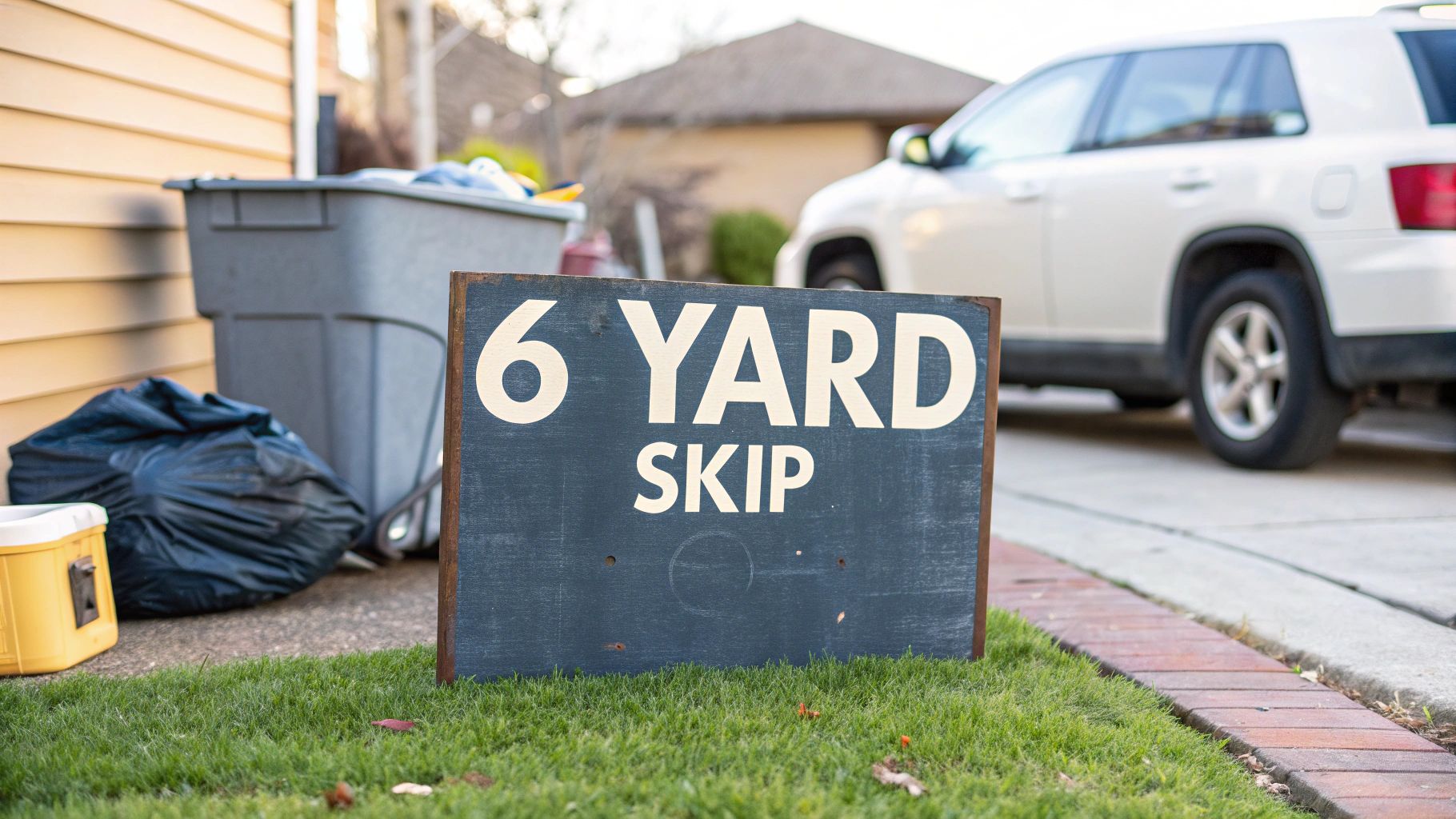A Guide to Local Skip Hire Prices in the UK
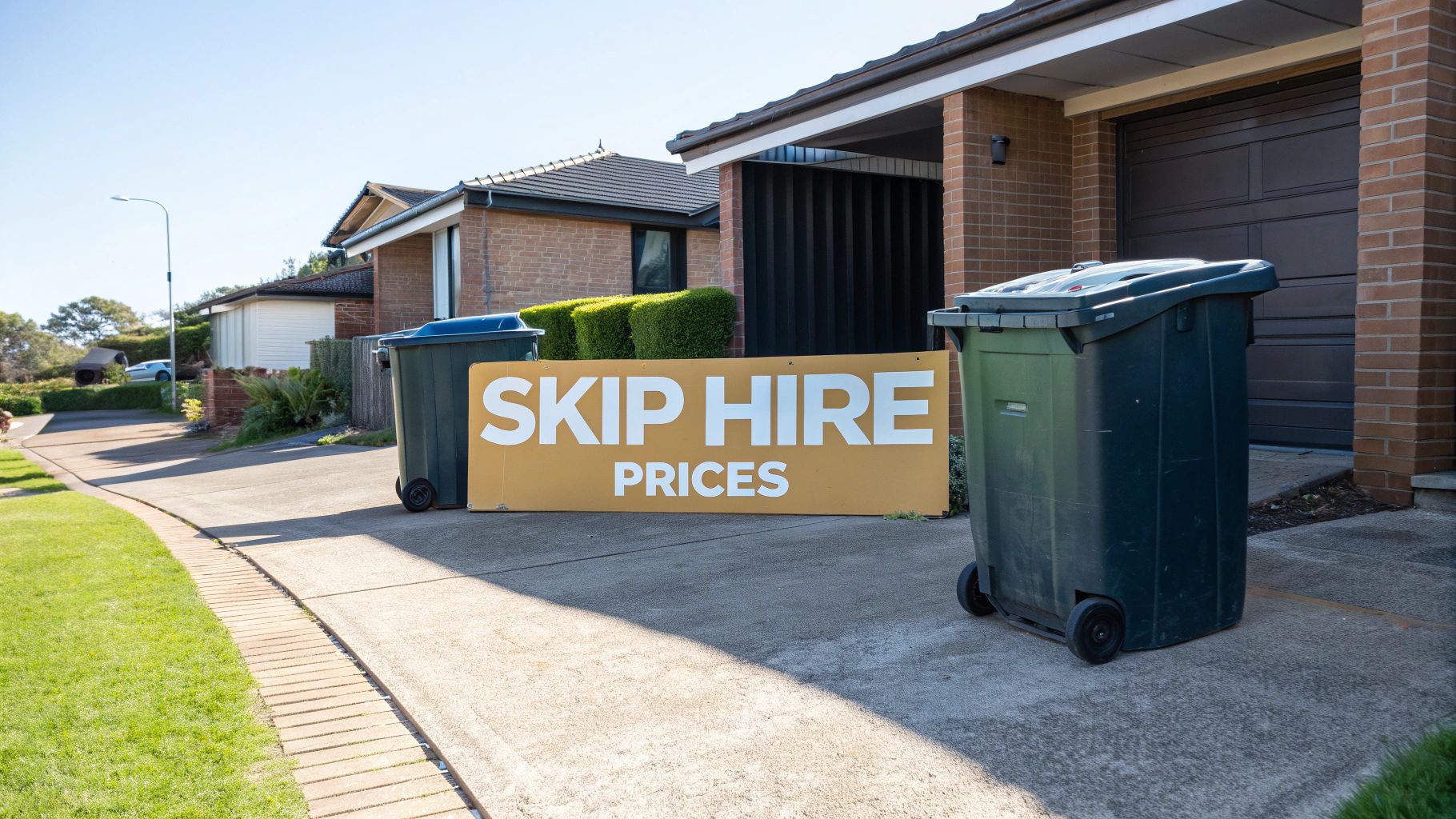
A Guide to Local Skip Hire Prices in the UK
Trying to figure out local skip hire prices can feel a bit like guesswork. You’ll see figures anywhere from £60 for a small mini skip to well over £400 for a large builder’s skip. The price you’re quoted isn’t just a number plucked out of thin air; it’s carefully calculated based on a few key things, like the skip size you need, where you are, and what you’re throwing out.
What Actually Determines Local Skip Hire Prices
Think of it like ordering a takeaway pizza. The price for a basic margherita is your starting point, but the final bill changes once you add extra toppings, go for a larger size, and factor in the delivery fee to your postcode. In the world of waste, those “toppings” are the specific factors that shape your final quote.
Getting your head around these elements is the first step to making sure you get a fair price and avoid any nasty surprises down the line. Before you can start comparing quotes, you need to know exactly what you’re paying for.
The Four Pillars of Skip Pricing
When you boil it down, every skip hire quote is built on four main things. Each one plays a part in the final cost, and a change in one can easily affect the others.
- Skip Size and Volume: This is the most straightforward one. A bigger skip holds more waste, needs a bigger lorry to deliver and collect it, and costs more to process at the facility.
- Your Geographic Location: Where you live really does matter. Prices can vary quite a bit from one area to another because of different local landfill and recycling fees, fuel costs, and even council regulations.
- Type of Waste: Let’s be honest, not all rubbish is the same. Getting rid of general household junk is priced differently from heavy construction waste like soil and rubble, mainly because of how they need to be sorted, recycled, and disposed of.
- Hire Duration: Most quotes include a standard hire period, often a week or two. If you need to keep the skip for longer, you’ll usually find extra daily or weekly charges added to your bill.
This image here gives a great visual breakdown of the main cost factors.
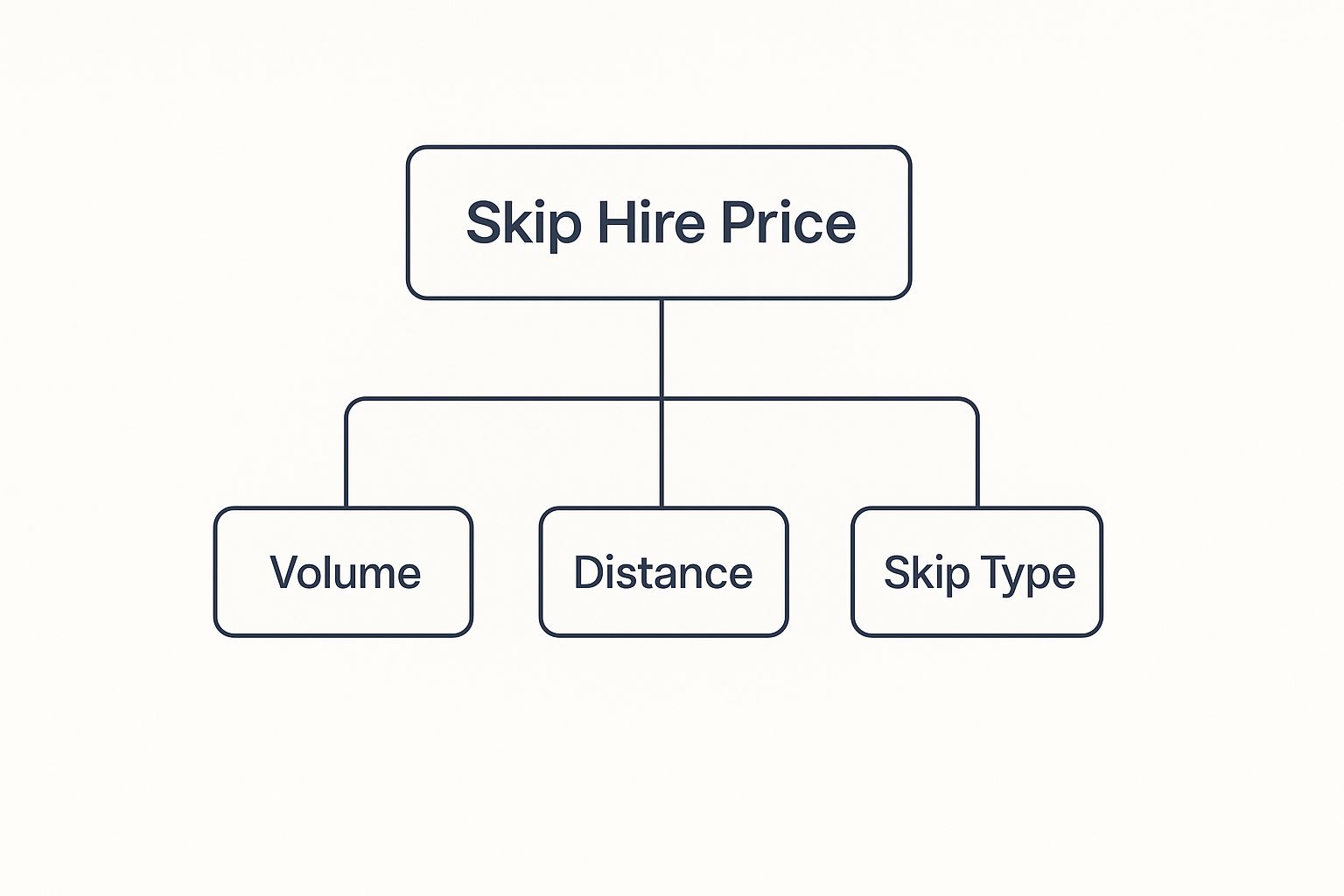
As you can see, it’s the combination of how much waste you have, how far it needs to travel, and what it’s made of that really builds the foundation of the price.
To help you see how these factors come together, here’s a quick-glance table.
How Key Factors Impact Your Skip Hire Quote
| Influencing Factor | Impact on Price | Example |
|---|---|---|
| Skip Size | The larger the skip, the higher the price. | An 8-yard builder’s skip costs more than a 4-yard midi skip. |
| Location | Prices fluctuate based on local council fees & transport costs. | A skip in central Bournemouth might be priced differently to one in rural Dorset. |
| Waste Type | Heavier, specialist waste costs more to process. | A skip filled with soil and rubble is more expensive than one for general house clutter. |
| Hire Duration | Extending the standard hire period adds extra charges. | Keeping a skip for three weeks instead of the standard two will increase the final bill. |
This table makes it clear how each element contributes to your final quote, so you know exactly what you’re paying for.
Sizing Up the Cost
The link between a skip’s size and its price is pretty direct. For example, a little 2-yard skip, which is perfect for about 30 bin bags of waste, will typically set you back somewhere between £60 and £130.
Move up to a standard 6-yard builder’s skip (holding around 60 bin bags), and you’re looking at a range of £120 to £300. The larger 8-yard skips can push the price up to £370.
Your skip hire fee is just one piece of the puzzle, especially on a bigger project. It’s often helpful to see how it fits into the overall UK home renovation costs to get a full picture of your budget.
Key Takeaway: While a larger skip has a higher upfront cost, it can actually save you money. It’s often cheaper than ordering a second, smaller skip if you underestimate how much you need to get rid of. A little planning goes a long way.
For a more detailed look at how these numbers stack up, check out our full guide on how much it is to hire a skip. Being armed with this knowledge means you can ask the right questions and feel confident when you’re looking at quotes.
Why Your Postcode Heavily Influences Skip Costs

It might seem a bit odd, but your postcode is one of the biggest factors when it comes to local skip hire prices. A quote for a skip in a quiet Dorset village will almost certainly look different from one for the exact same skip in central London. This isn’t just a random price hike; it’s a direct reflection of what it costs to operate in that specific area.
Think of it this way: your local skip hire company has local bills to pay. Everything from the wages for their drivers to the fees charged by the council at the local waste transfer station is tied to the region they work in. Naturally, these costs have to be factored into the price you, the customer, pay.
This is exactly why relying on a “national average” price can be so misleading. It completely smooths over these crucial regional differences, leaving you with a figure that might be miles off what you’ll actually be quoted. Getting your head around these local dynamics is the first step to setting a realistic budget.
The North-South Price Divide
One of the clearest trends you’ll see in UK skip hire is the price difference between the North and the South of England. As a general rule, hiring a skip gets more expensive the further south you go, with London sitting right at the top of the price ladder.
This isn’t just about higher demand. It’s rooted in basic economics. Land is pricier in the South, which means the depots and recycling facilities cost more to run. Fuel prices can vary, and higher living costs often lead to higher staff wages. It all adds up.
Key Insight: When you hire a skip, you’re not just paying for a metal box. You’re covering a piece of the entire local operation – from the driver’s wages and lorry fuel to the specific landfill taxes and disposal fees in that council area.
A Look at Regional Price Ranges
The price gap between different parts of the country is significant and has a direct impact on local skip hire prices. For instance, hiring a small 2 to 3-yard mini skip up North might cost you anywhere from £65 to £110. Down in the South of England, the price for that same skip jumps to between £90 and £150.
Unsurprisingly, London is in a league of its own. Thanks to intense demand, traffic congestion, and much higher operating costs, that same mini skip could set you back anywhere from £135 to £175. You can explore more on these regional price breakdowns to get the full picture.
This variation really shows why getting quotes from genuinely local suppliers is so important. A company based in your area understands the local cost structure and can give you a much more competitive and accurate price than a national broker who might just be guessing.
How to Choose the Right Skip Size for Your Project
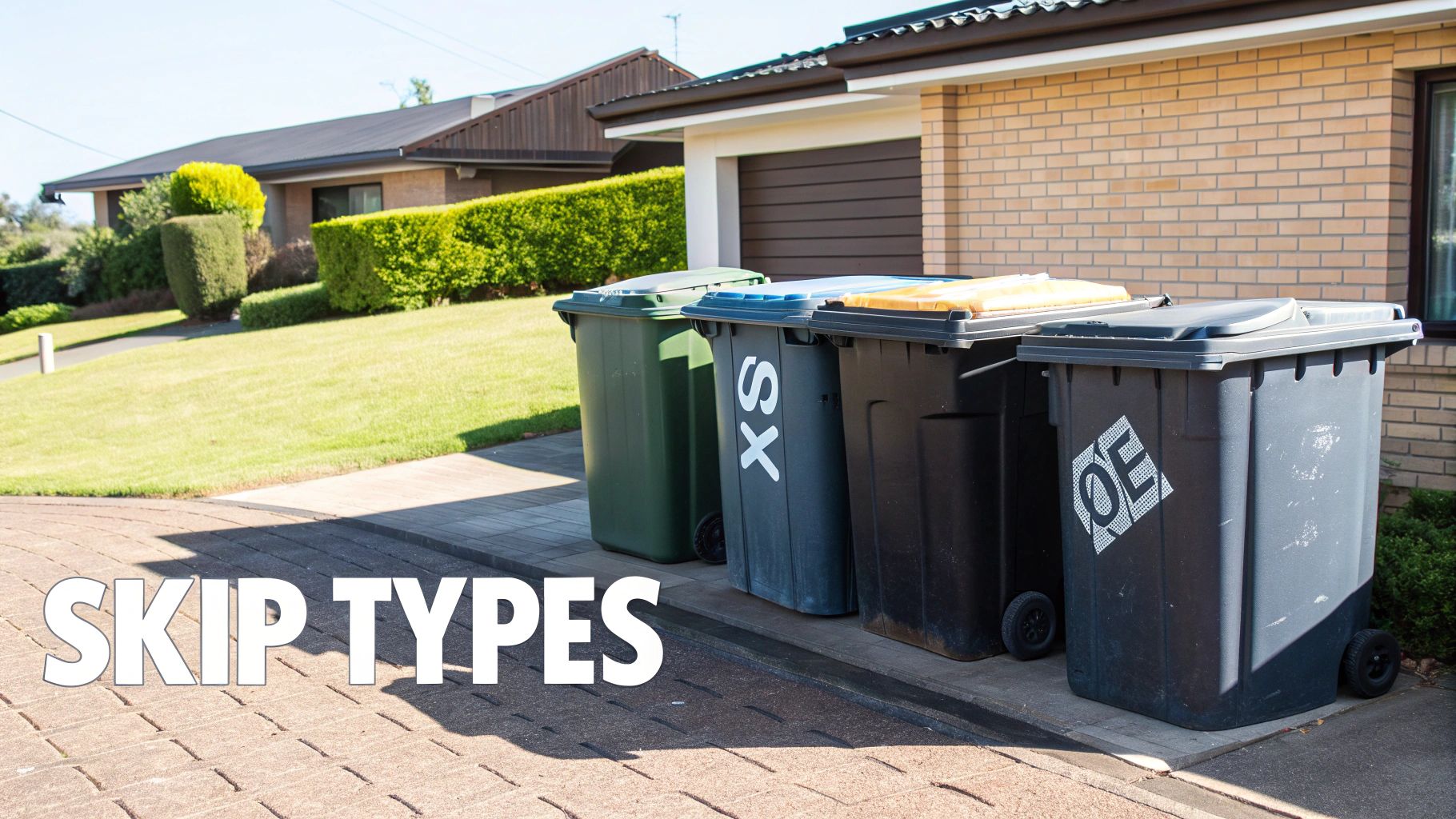
Picking the right skip size can feel a bit like a guessing game, but it’s a decision that directly impacts how much you’ll pay. Get it wrong, and you could face problems. A skip that’s too small means the hassle and cost of ordering a second one. Go too large, and you’re just paying for empty space you never needed.
The simplest trick is to think about your waste in terms of bin bags. Before you book anything, try to get a rough idea of how many standard black bin bags your project is going to create. A quick estimate like this makes it much easier to match your job to the perfect skip size, saving you a headache and some cash.
Mini Skips: The Small Project Solution
The smallest skips you can hire are often called “mini skips,” and they’re typically 2 to 3 cubic yards. Think of these as your go-to for small-scale clear-outs.
A 2-yard skip, for instance, can hold around 20-30 black bin bags. It’s perfect for those jobs where a few trips to the local tip feel like too much faff, but you don’t have a mountain of rubbish to shift.
Common uses for mini skips include:
- Small garden clearances like emptying a shed or cutting back overgrown hedges.
- Minor DIY tasks, such as redecorating a single room.
- Decluttering a loft or garage and getting rid of old household bits and bobs.
Midi Skips: The Versatile All-Rounder
Stepping up a size gets you to the “midi skip,” which is usually around 4 to 5 cubic yards. This is the sweet spot for a lot of home projects, giving you a good amount of space without taking up your entire drive.
A 4-yard skip is a very popular choice, holding roughly 40-50 bin bags. It’s big enough for a decent clear-out but still compact enough to fit on most properties without needing a permit.
Midi skips are the ideal middle ground for projects too big for a mini skip but not quite big enough to justify a full-blown builder’s skip. It’s the go-to for homeowners tackling bigger home improvement jobs.
Builder’s Skips: For Major Renovations
When most people picture a skip, they’re probably thinking of a “builder’s skip.” These are the real workhorses of the waste world, typically coming in at 6 to 8 cubic yards. They’re pretty much essential for any large construction or renovation work.
A 6-yard builder’s skip can take about 60-70 bin bags, making it great for bulky waste from a kitchen or bathroom refit. The larger 8-yard skip manages up to 80 bin bags, which is perfect for bigger building jobs or major garden landscaping involving lots of soil and rubble.
Making the right choice is key, as the size directly affects your local skip hire prices. If you want to dig a bit deeper and get more advice, check out our in-depth guide on what size skip you might need. It’ll help you make sure you get the best value for your project.
Understanding Permits and Other Hidden Costs
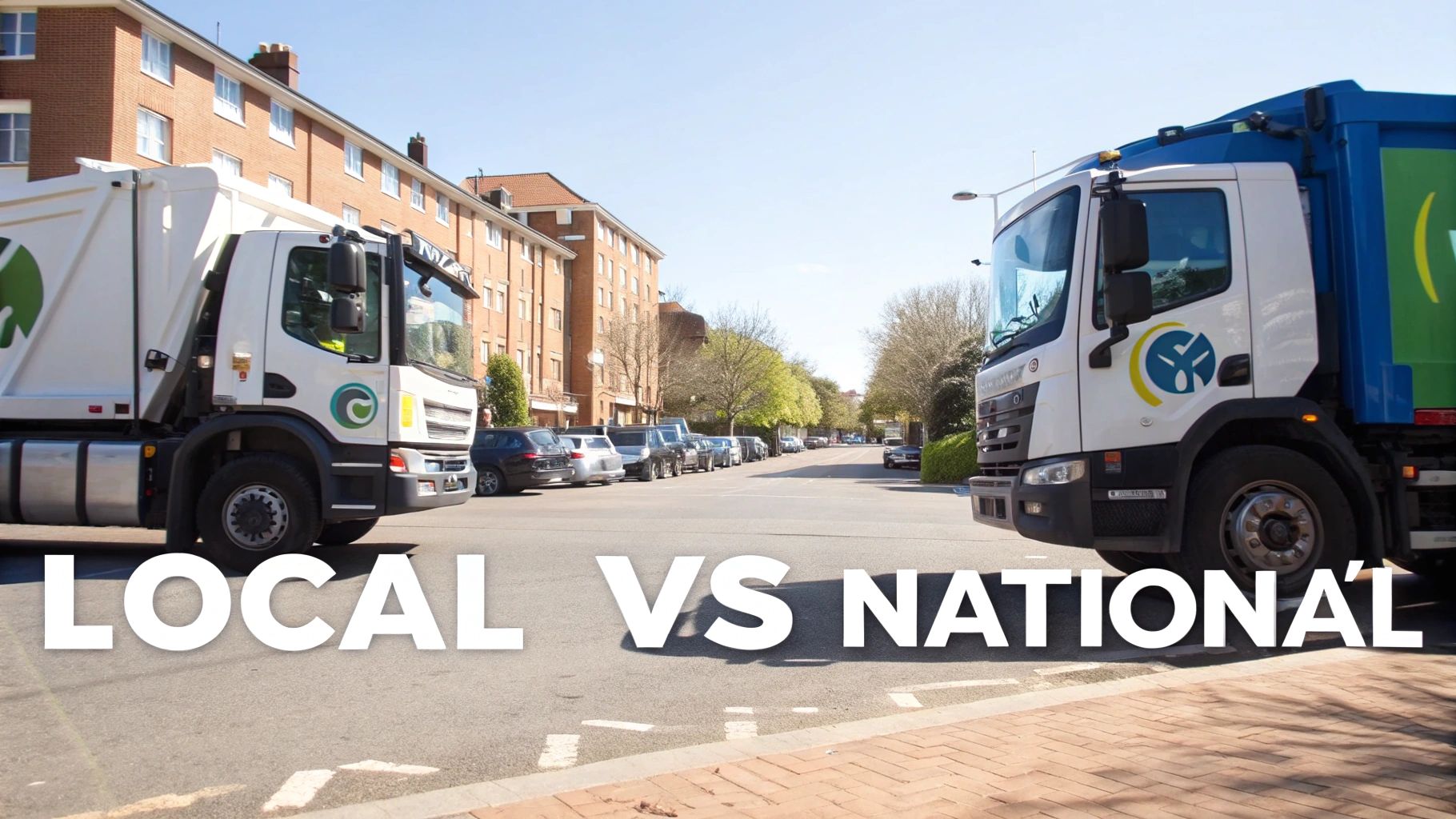
The price you’re first quoted for a skip is a big piece of the puzzle, but it doesn’t always tell the whole story. A few extra costs can pop up if you’re not ready for them, quickly turning a good deal into an unexpected headache. The most common culprit? The skip permit. It’s an easy detail to miss, but a crucial one to get right.
If you don’t have a private driveway or some other off-road space, your skip will have to sit on public land, like the road right outside your house. This means you need official permission from your local council, which comes in the form of a permit. Don’t worry, your skip hire company will almost always sort this out for you, but the cost gets passed directly on to you.
What’s surprising is how much these permit prices can vary. Depending on which council you fall under, the charge for placing a skip on a public road can be anything from £15 to over £180 for a typical 14-day hire. That’s a huge variable that can seriously change the final bill. You can learn more about how these skip hire costs break down and see just how different council fees can be.
Beyond the Permit Fee
While permits are the most frequent extra charge, they aren’t the only ones that can catch you out. It’s worth knowing about these other potential costs so you can ask the right questions before locking in your booking.
- Overloading Charges: Every skip needs to have a ‘level load’. If you pile waste higher than the sides, the driver might refuse to take it for safety reasons. You could also be hit with a penalty fee for the extra waste.
- Prohibited Item Fees: You can’t mix certain things like mattresses, plasterboard, tyres, or electrical items with general waste. If these are found in your skip, expect to be charged an extra disposal fee.
- Extended Hire Periods: Most standard hires last for one or two weeks. If your project takes longer than planned and you need the skip for a few extra days, you’ll have to pay more for the extended rental period.
Key Takeaway: Always ask for a fully itemised quote. A good, reputable company will be upfront about all the potential extras, including permit fees, surcharges for certain items, and what it costs to keep the skip a bit longer.
Getting a clear picture of these potential “hidden” costs from the start means the price you’re quoted is the price you actually pay. A quick chat about these details upfront can save you a nasty surprise down the line, keeping your project on budget and completely stress-free.
Actionable Tips for Saving Money on Your Skip Hire
Knowing what affects local skip hire prices is one thing, but using that knowledge is how you’ll actually keep some cash in your pocket. A few smart moves can make a real difference to the final bill, helping you keep your project on budget without cutting any corners.
It’s a bit like buying a car. You wouldn’t just snap up the first one you see. You’d think about the engine size, how thirsty it is for fuel, and what it’ll cost to run. If you take that same measured approach to hiring a skip, you’ll find the best possible value for what you need.
Plan Your Project and Waste in Advance
Rushing into hiring a skip is a surefire way to pay over the odds. Last-minute bookings can often attract premium rates, especially when everyone else is doing a clear-out. Planning ahead gives you the breathing room to properly figure out what you need and compare your options without feeling pressured.
Just as important is getting your waste sorted before it even touches the skip. Some companies will give you a better price for skips that only contain one type of material, like soil or hardcore, simply because it’s so much easier and cheaper for them to process and recycle. Tossing everything in together often means you’ll face higher disposal fees.
Pro Tip: Have you considered a ‘wait and load’ service? If you can get all your waste piled up and ready to go, the lorry driver simply waits while you load the skip. This can be a much cheaper option as it often means you don’t need a pricey council permit.
Compare Quotes from Local Suppliers
Never, ever take the first quote you’re given. Prices can vary wildly between local firms, even for the same size skip in the very same postcode. Do yourself a favour and get at least three different quotes to get a real feel for the going rate in your area.
But a word of caution: if a price seems too good to be true, it probably is. A suspiciously low quote could be hiding extra costs or, worse, might be from a company that doesn’t dispose of your waste responsibly. To get the full picture, our guide explains why the lowest price is not always best for skip hire, which will help you spot any potential red flags.
To make sure you’re getting the best deal, just follow these simple steps:
- Choose the Right Size: Use what you know about skip capacities to pick the one that fits your project, so you’re not paying for empty space.
- Get Multiple Quotes: Ring around a few local, reputable companies and give them the exact same details for a fair comparison.
- Confirm All-Inclusive Pricing: Ask each company straight up if their quote includes delivery, collection, disposal fees, and any VAT.
- Check the Hire Period: Make sure the standard hire time fits your project’s schedule to avoid getting stung with extra charges for an extension.
For anyone taking on a bigger job, like one of the many houses for sale needing renovation you see across the UK, budgeting for waste disposal is a massive part of the financial plan. Follow these tips, and you’ll make sure your waste management is both efficient and easy on the wallet.
Your Skip Hire Questions Answered
Even when you’ve got a handle on the basics, there are always a few lingering questions that pop up right when you’re ready to book. Getting these sorted can make all the difference, giving you the confidence that there won’t be any last-minute surprises with your local skip hire prices.
Is It Cheaper to Hire a Skip During the Week?
You might think a Tuesday delivery would be cheaper than a Saturday one, but the daily hire rate doesn’t usually change. That said, booking your skip for a mid-week drop-off (think Tuesday to Thursday) can sometimes work in your favour.
Demand is often a bit lower then compared to the weekend rush or a busy Monday, which can mean more delivery slots are available. The real secret to a better price, though, isn’t about the day of the week—it’s about booking well in advance. Trying to get a skip at the last minute, especially during busy periods, can sometimes cost you more.
What Can I Not Put in a Skip?
This is a big one. To keep everyone safe and make sure waste is recycled properly, there are strict rules about what can go into a general waste skip. Think of it as sorting your rubbish, but on a bigger scale.
Items that are almost always a no-go include:
- Hazardous Materials: Things like asbestos, paint, solvents, oils, and gas canisters are strictly forbidden. They need specialist disposal.
- Electricals (WEEE): Got an old fridge, TV, or computer monitor? These can’t go in the skip as they need to be handled separately.
- Other Restricted Items: Plasterboard, batteries, and old tyres also need their own disposal route and can’t be mixed in with your general waste.
If you’re ever in doubt, just ask. Popping prohibited items in your skip can lead to it not being collected or landing you with some hefty extra charges.
Is It Cheaper to Take Rubbish to the Tip Myself?
For a tiny clear-out—say, a single car boot’s worth of garden trimmings—then a trip to your local council tip can make sense, as long as you have a suitable car and don’t mind the effort.
But for anything more substantial, like a proper garden project or a room renovation, a skip quickly becomes the smarter choice. Once you factor in your own time, the fuel for multiple trips back and forth, and the sheer hassle of it all, hiring one skip to take it all away in one go is nearly always the more cost-effective and convenient option.
Ready to get a clear, competitive quote for your project? The Waste Group offers transparent pricing and a price-match guarantee. Get your instant online quote today at https://www.thewastegroup.co.uk.
